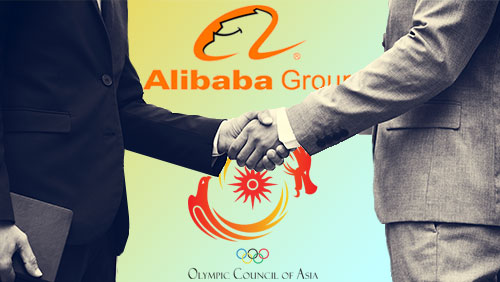Alibaba Group Holdings, one of the largest e-commerce companies in the world has entered into a strategic partnership with the Olympic Council of Asia, and it’s Open Sesame for one particular burgeoning sport.
Soon the children of the world will throw down their headsets, jump out of their gaming chairs, run down the apples and pears, and stick two fingers in the face of their parents in a classic told you so moment as esports continues to garner a reputation as a bona fide sport.
 The latest stripe on the arm of the world of competitive virtual world gaming came in Hangzhou, China, where the Asian e-commerce giant Alibaba Group Holding Ltd and the Olympic Council of Asia (OCA) agreed to jump into bed.
The latest stripe on the arm of the world of competitive virtual world gaming came in Hangzhou, China, where the Asian e-commerce giant Alibaba Group Holding Ltd and the Olympic Council of Asia (OCA) agreed to jump into bed.
The strategic partnership will see esports games featuring as a demonstration sport at the 2018 Asian Games in Jakarta and Palembang in Indonesia next summer, before being added as a medal event at the 2022 Asian Games (XXII Asiad) in Hangzhou, China.
And headsets and keyboards won’t only be featuring in the Asiad. Representatives from the OCA also confirmed that esports would feature as a demonstration sport in the 2017 Asian Indoor and Martial Arts Games held in Ashgabat, Turkmenistan in September. 62 Asian nations will compete in 21 different sporting events, with over 2,000 bronze, silver, and gold medals given to the victors
A representative from the OCA said that the decision represented “the rapid development and popularity of this new form of sports participation among the youth.”
It is a monumental moment in the young life of esports. The XVII Asiad held in Incheon, South Korea saw close to 10,000 athletes, representing 45 nations, competing in 439 events, making it the largest multi-sport event in the world outside of the Olympic Games.
Alibaba’s sporting subsidiary Alisports will manage the finer details of the strategic partnership. Formed in 2015, Alisports made their love for esports clear from the off when they partnered with the International esports Federation (IESF), and ploughed $14.5m into the creation of the World Electronic Sports Games (WESG). The first WESG took place in December where approx. 60,000 players, from 120 nations competed for $5.5m in prize money.
Is this just the beginning?
Will we see esports become a major Olympic sport by the time we are staring at the roof of our wooden box?
Consider, Alibaba signed an 11-year deal worth $1 billion with the International Olympics Committee (IOC) to join the likes of Coca-Cola, Visa, and McDonald’s as the lead sponsors for the summer and winter Olympic games.